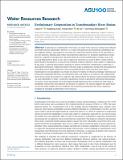Evolutionary cooperation in transboundary river basins
Author(s)
Yu, Yang; Tang, Pingzhong; Zhao, Jianshi; Liu, Bo; McLaughlin, Dennis
DownloadPublished version (17.56Mb)
Publisher Policy
Publisher Policy
Article is made available in accordance with the publisher's policy and may be subject to US copyright law. Please refer to the publisher's site for terms of use.
Terms of use
Metadata
Show full item recordAbstract
Cooperation in transboundary river basins can make water resources systems more efficient and benefit riparian stakeholders. However, in a basin with upstream and downstream stakeholders that have different interests, noncooperative outcomes have often been observed. These can be described by a one-shot prisoners' dilemma game where noncooperation (defection) is a dominant equilibrium strategy. However, cooperative outcomes have also been observed in several transboundary settings, such as the Lancang-Mekong River Basin in Asia. Such cooperation motivates our research effort to refine relevant game theoretic descriptions to account for the evolution of players' behaviors, from conflict to cooperation. In this study, a repeated game model is proposed to analyze evolutionary transboundary cooperation. A generalized evolutionary cooperation pattern with four stages is summarized, starting with noncooperation and ending with in-depth cooperation. The Lancang-Mekong River Basin and three other typical transboundary river management case studies are chosen to validate our theoretical findings. Upstream and downstream stakeholder behaviors are analyzed for these case studies, in accordance with a game payoff matrix that accounts for incentives to cooperate. The results indicate that patience and incremental benefits can lead stakeholders to adopt a cooperative equilibrium strategy if appropriate institutional mechanisms are in place. Such mechanisms can be developed through negotiations that recognize the wide range of stakeholder interests that may influence the decision to cooperate. Our analysis suggests that game theory can provide useful insights into the conditions and institutional mechanisms that foster cooperative strategies for managing transboundary water resources. ©2019. American Geophysical Union. All Rights Reserved.
Date issued
2019-10Department
Parsons Laboratory for Environmental Science and Engineering (Massachusetts Institute of Technology)Journal
Water Resources Research
Publisher
American Geophysical Union (AGU)
Citation
Yu, Yang et al., "Evolutionary Cooperation in Transboundary River Basins." Water Resources Research 55, 11 (November 2019): 9977-94 doi. 10.1029/2019WR025608 ©2019 Authors
Version: Final published version
ISSN
1944-7973